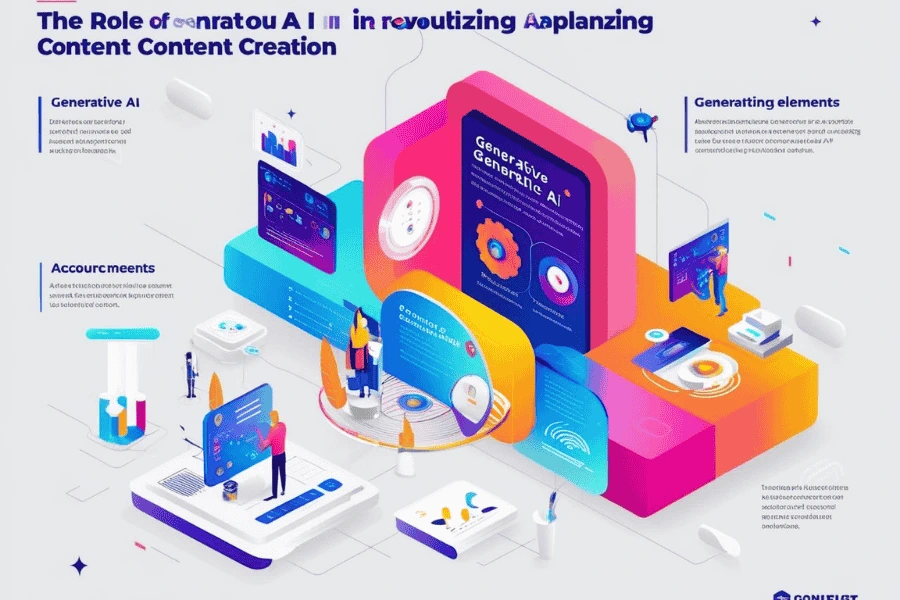The Role of Generative AI in Revolutionizing Content Creation
The digital content landscape is undergoing a seismic shift, driven by the emergence of Generative AI—a form of artificial intelligence capable of producing text, images, video, music, and code. What was once a time-intensive, manual process now benefits from tools that can instantly generate drafts, brainstorm ideas, and even produce fully formed creative works. From marketing and journalism to entertainment and education, generative AI is reshaping how content is conceptualized, created, and consumed.

Understanding Generative AI
Generative AI refers to algorithms—particularly large language models (LLMs) and generative adversarial networks (GANs)—that create new content by learning patterns from existing data. Unlike traditional AI, which classifies or predicts, generative models produce. ChatGPT, DALL·E, Midjourney, and Runway are examples of AI that can write, draw, compose, and animate with human-like fluency.
Accelerating Content Creation Workflows
Generative AI dramatically reduces the time and effort involved in content production. Writers can use AI to:This speed enables teams to focus more on strategy, creativity, and storytelling—letting the AI handle repetitive or lower-value tasks.
Personalization at Scale
One of the most transformative benefits of generative AI is hyper-personalization. Marketers can now produce hundreds of tailored messages for different audience segments, personalized by interests, location, behavior, and more. AI can dynamically generate personalized emails, product descriptions, or ad copy that resonates deeply with individual users.
Visual and Multimedia Innovation
Beyond text, generative AI can produce high-quality visual and video content: Image Generation: AI tools like DALL·E or Midjourney generate unique visuals based on prompts. Video Creation: Platforms like Runway and Sora can automate video editing or generate videos from text. Music & Voice: AI can generate background music, sound effects, or synthetic voice overs that mimic human speech. These tools are democratizing multimedia production—enabling creators without traditional design or technical skills to produce professional-grade assets.
Use Cases Across Industries
Marketing: Auto-generate ad copy, landing pages, and personalized campaigns. Journalism: Write summaries, headlines, and data-based stories. Education: Create adaptive learning materials and instant feedback. E-commerce: Generate product descriptions, customer service responses, and AR try-on visuals. Entertainment: Scriptwriting, storyboarding, and content ideation
Collaboration, Not Replacement
Rather than replacing human creativity, generative AI serves as a powerful collaborator. It assists writers, designers, and marketers by handling ideation, drafting, and versioning. Humans still play a critical role in editing, fact-checking, curating, and adding emotional nuance—elements where human judgment outperforms automation.
Ethical and Creative Challenges
With powerful capabilities come complex questions: Originality: Can AI-generated content be considered "creative"? Plagiarism: AI may inadvertently replicate training data. Bias: AI systems can perpetuate or amplify cultural or gender biases. Authenticity: Audiences may value content less if they know it was created by AI. Brands and creators must navigate these issues responsibly by being transparent, applying ethical standards, and combining AI with human oversight.
Conclusion: A Creative Renaissance Powered by AI
Generative AI marks the beginning of a new era in content creation. It empowers creators to work faster, scale wider, and personalize deeper than ever before. While challenges remain, the potential for innovation, efficiency, and creativity is vast. By embracing generative tools as creative partners—not replacements—brands, educators, and storytellers can unlock new dimensions in digital expression.
Active Events
3 Essential Projects to Elevate Your 5c of Content Marketing Portfolio
Date: Aug 05, 2025 | 7:00 PM(IST)
7:00 PM(IST) - 8:10 PM(IST)
2432 people have registered
Transition from Non-Data Science to Data Science Roles
Date: Aug 07, 2025 | 7:00 PM (IST)
7:00 PM (IST) - 8:10 PM (IST)
2753 people have registered
Bootcamps
Digital Marketing Bootcamp
- Duration:4 Months
- Start Date:Aug 09, 2025
Data Science Bootcamp
- Duration:4 Months
- Start Date:Aug 09, 2025
